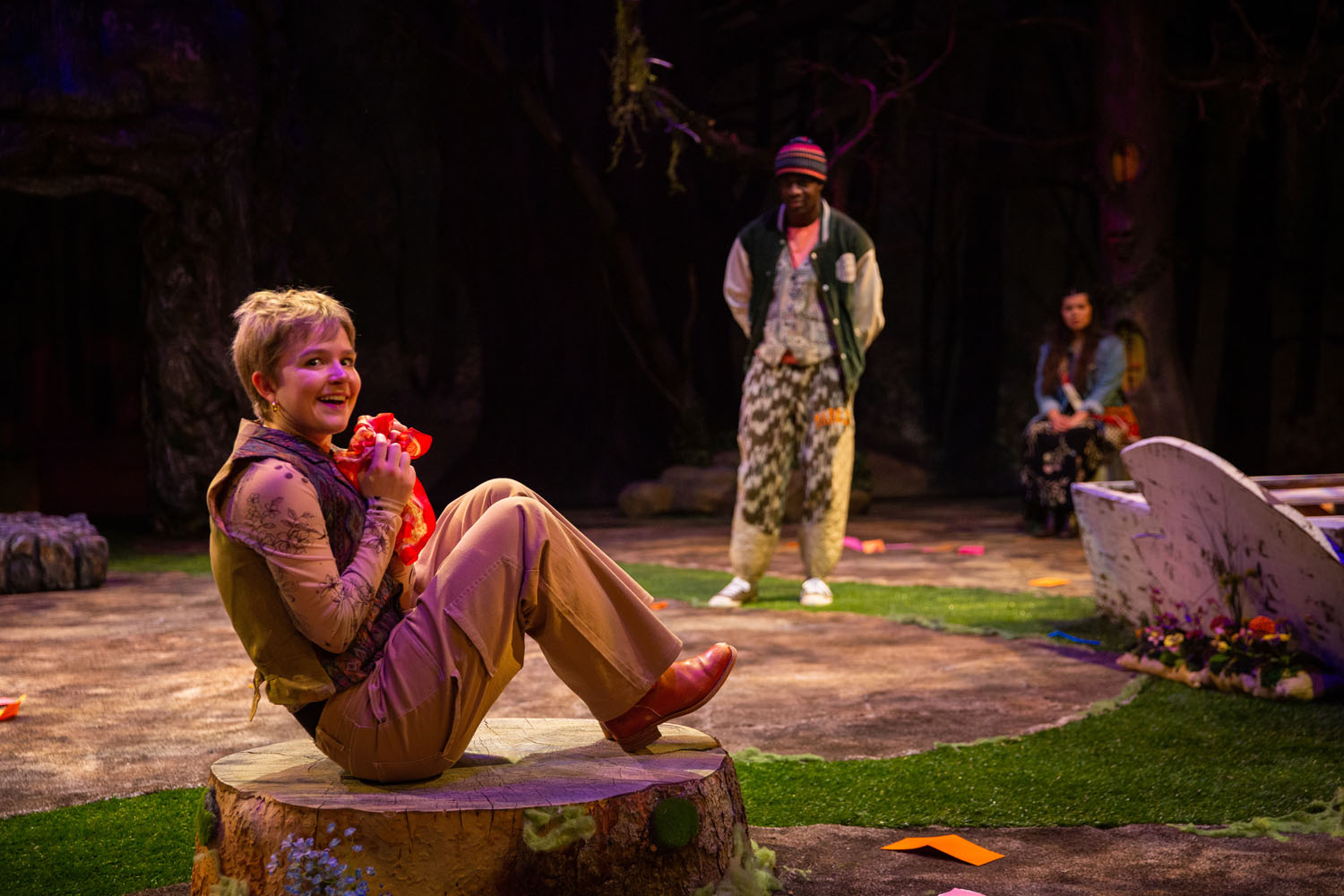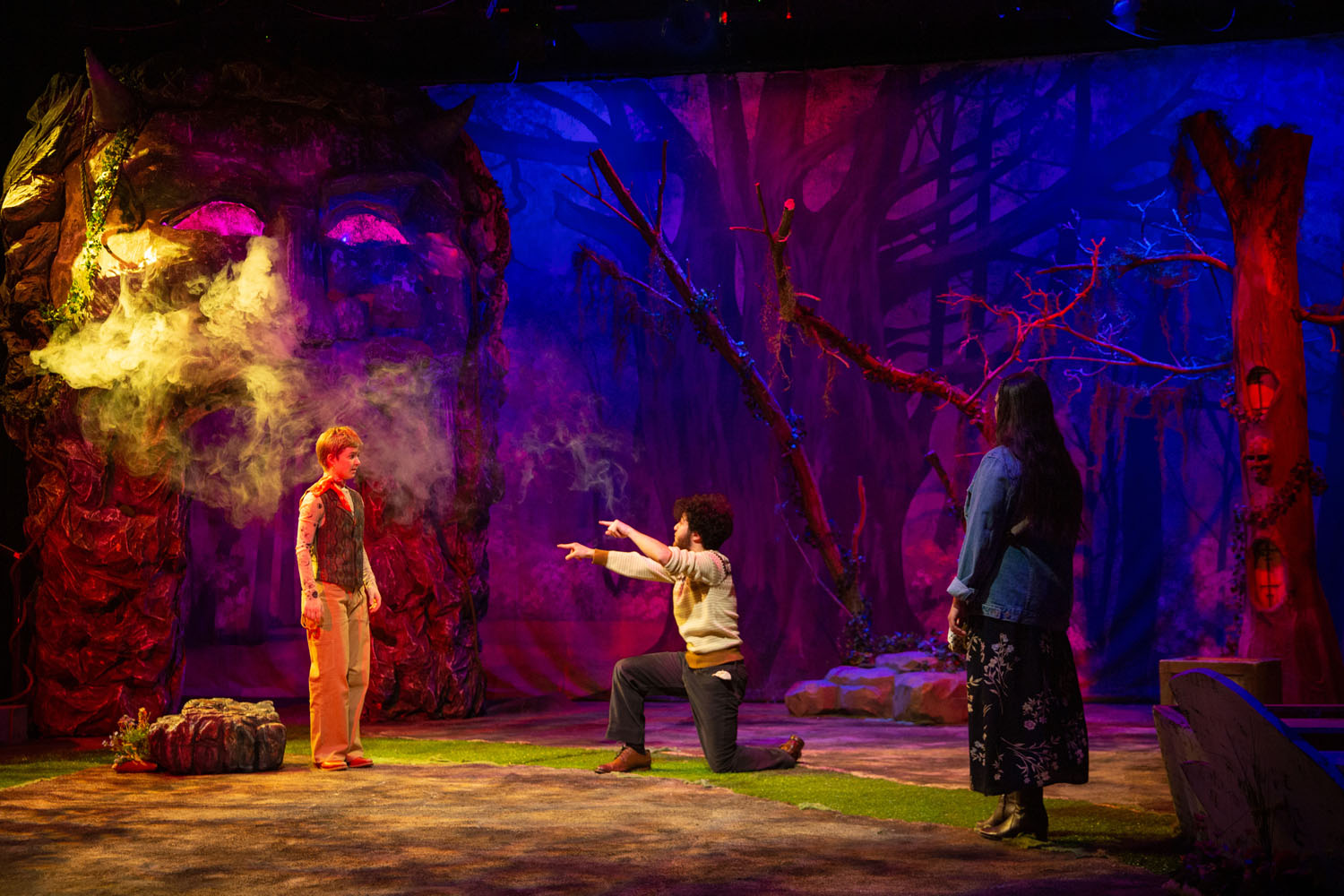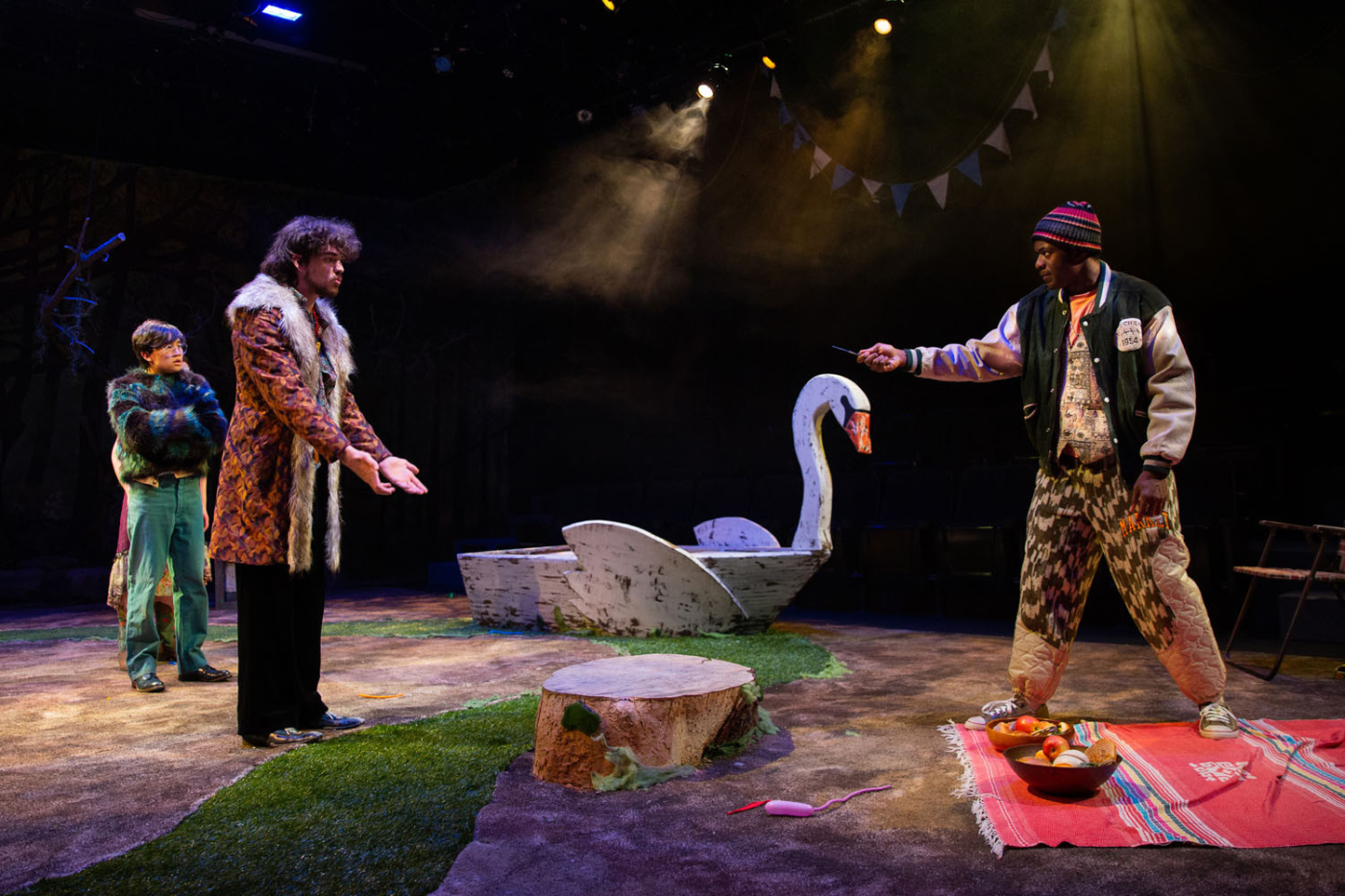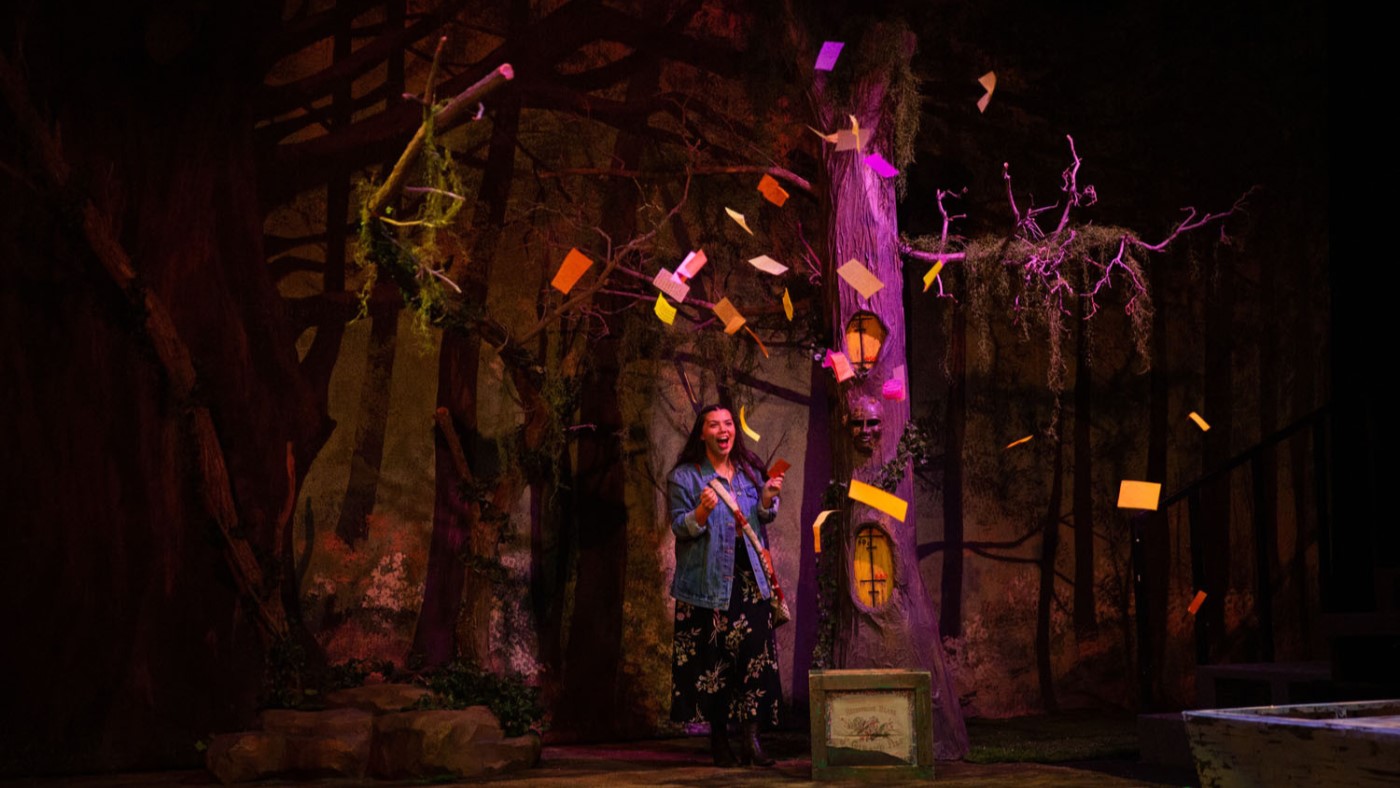SALT LAKE CITY — For regular theatre-goers, seeing Shakespeare is almost mandatory. His work has been produced and adapted for centuries, with no signs of stopping, and each new iteration can be a fresh take on his tried-and-true work.

At the University of Utah, As You Like It (directed by Robert Scott Smith) felt like a fever dream that opens with Arden Forest, a magical set created by scenic designer Kaitlyn Crosby. The set, and its elements, are interacted with in a plethora of ways; in a prologue, the actors all eat the apples placed neatly on tree stubs, Orlando places love notes in the trees, and characters sit in the swan boat and hide behind the foliage to spy on other characters.
The play itself opens in a whirlwind, Orlando (played by Tobi Okhimamhe) and his older brother, Oliver (played by Tyler Kline) engage in a fistfight that culminates with Orlando dunking his brother’s head into a pail. Soon, Orlando is engaged in a wrestling match with Charles (played by Matthew Jbara). That energy continues as the play progresses, and characters are joyously raucous throughout the play. For example, when the Touchstone (played by Zac Thorn) first appears in the play, he is swirling about, hooting, and hollering. He does several impressive backflips and begins to prance about the set, and never runs out of energy as he delivers his lines. Almost everyone on stage is energetic to the point that the play, at times, feels too high spirited. Watching the sheer amount of running, yelling and flailing that many of the characters do can feel tiring.

Smith’s lively directing can be found elsewhere, such as Rosalind’s (played by Camden Barrett) frequent tendency to throw herself onto the stage floor. Barrett’s performance throughout the show is packed with enthusiasm, and it is easy to be impressed by the liveliness that Rosalind/Ganymede, Touchstone, and others show when constantly moving about and never once appear to be out of breath. When Rosalind and Orlando are together, Rosalind spends their scenes flailing and exclaiming, making their moments feel hollow. The same can be said of Rosalind and Celia (played by Abyanna Wood); most of their interactions are Celia delivering information to Rosalind, who is excitable each time. Barrett gives a dedicated performance, but it lacks variety, likely due to the directing.
Okhimamhe’s Orlando is a himbo: tenderhearted, sweet but not the brightest bulb in the box. In one scene, after his wrestling match, he is rolling around on the floor, giddily reciting Rosalind’s name over and over. In another scene, toward the end of the play, Rosalind is beside herself after Orlando is attacked by the lion, with his arm in a sling. Afterward he responds in an almost confused manner, “but it’s my arm.” It is an odd choice, but I can appreciate Okhimamhe’s dedication to it.
Although many of the actors have a lot of physical presence in the play, the emotional intimacy felt rushed. There is not enough time for characters to interact and sell what is happening between them. The acting itself is fine from this well trained cast, but the directing does not allow scenes to linger, as the play moves from scene to scene, act to act. This As You Like It bombards its audience with new characters and situations, leaving little time to settle into the action. Some of the most intimate scenes in the play were the least relevant: the shepherd coming out with her goats (all played by the actors), the Duke and his servants hanging out in the woods together, or Phebe (played by Debora Ingabile) and Silvius (played by Tyler Van Oostendorp) talking about how Phebe is in love with Ganymede. These scenes worked because the actors actually slowed and allowed the audience to enjoy the moment.

Where the cast excels is in terms of the actor’s body being a tool, and every one used carefully chosen facial expressions and gestures to convey a character’s intent. But in regards to the emotional depth of the play, Smith’s directing placed a higher priority prioritizing hijinks over intimate moments, making it difficult for the actors to deliver both emotion and humor.
One lovely aspect of the play is the four musical numbers that Amiens/Jacques de Boys (played by James Wong) sings. In the first number, “Under the Greenwood Tree,” he is accompanied by Corin (played by Sandra Detweiler) who plays a ukulele. Wong has a beautiful singing voice that immediately made me wish there was soundtrack to buy, or at least listen to, after the show. The music adds to the revelry in the play, particularly the last one sang by the entire cast.
Although there is quite a bit to enjoy about the play, there are aspects that disappoint. For example, no one seems to know what to do with Jacques (played by Caro Ciet), who waxes poetically about all manner of things (such as melancholy) and gives the famed “all the world’s a stage” speech to Duke Frederick’s servants. But there is little connection that Jacques has with other characters in the forest. Additionally, having Cade Friermuth play both Duke Senior and Duke Frederick (a common double-casting) caused difficulty when Friermuth played the two characters too similarly. Also, the relationship between Duke Senior and the other people in the forest was never shown clearly on stage. Often important information like this was only conveyed through the dialogue and was not easy to discern in the staging or the acting.

The costuming (designed by Emma Ashton) contributed to this confusion because it was not located in any specific time or place. While at the royal court, Celia and Rosalind resemble judges wearing long black, shapeless gowns with a white fluffy neck adornment. After their exile, their clothing is not linked to any period; Rosalind wears modern-day boots and slacks, while Celia’s outfits are unremarkable/nondescript. In the Forest of Arden, Phebe is dressed more like Little Bo Peep than an actual shepherd. Jacques wears fishnet knee stockings with black platform shoes and a large blue bowtie. Like the directing, the costuming seems to prioritize fun over anything else.
Other technical elements were memorable and sustained the action more. One notable use of lighting occurred during the wrestling match when the lights shift into dark purple hues as time stops. Rosalind, amazed, pulls down the pants of Charles and claps her hands to restart time, and the lights go back to their natural hue. Crosby’s set is memorable, especially for the large face of Pan that serves as an entrance and exit for actors and even emit smoke at one point.
As You Like It is an excitable romp through Arden Forest, featuring an array of characters moving in and out of each other’s lives, culminating in matrimony and merriment. When the production slows down and lets its audience get cozy with the characters, it succeeds, and the lovely set and emotional lighting are memorable. The pacing is often frantic, but all of Shakespeare’s beloved characters in this play are still there for an audience to enjoy.
[box]As You Like It plays Thursdays through Saturdays at 7:30 PM and Saturdays and Sundays at 2 PM at Studio 115 in the Performing Arts Building on the campus of the University of Utah. Tickets are $7.50-17.50. For more information, visit theatre.utah.edu.[/box]

